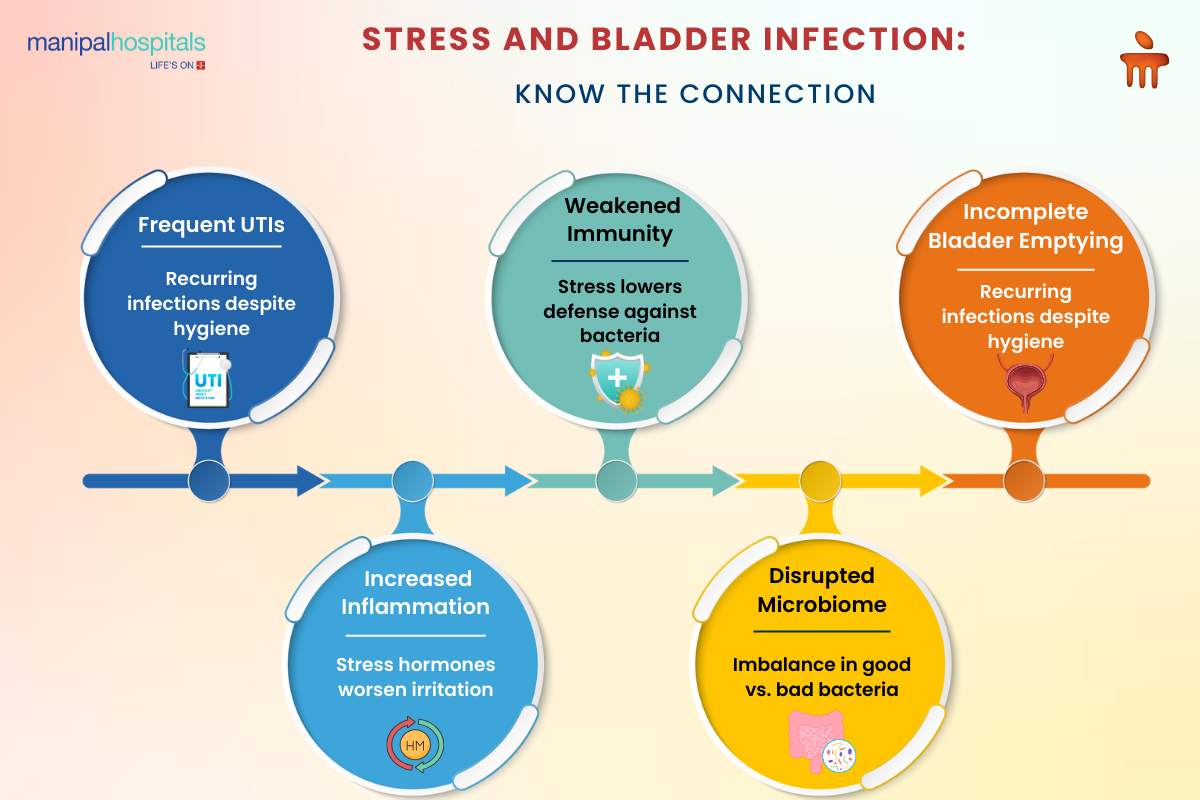
About 50% of Indian women experience urinary tract infections (UTIs) at least once in their lifetime - among these, nearly 15% have recurrent infections. Though bacterial invasion is the immediate cause of UTIs, recent research indicates that stress and psychological well-being might have major indirect roles. This blog investigates the relationship between psychological stress and UTIs, offering evidence-based facts for prevention and management.
Synopsis
The Science Behind Stress and Urinary Health
A Urinary Tract Infection (UTI) is an infection of your urinary system – kidneys, ureters, bladder, and urethra. Most UTIs involve the lower urinary tract – the bladder and the urethra. UTIs are primarily caused by bacteria, most commonly E. coli.
The relationship between stress and UTI is mediated through intricate physiological mechanisms. Stress does not directly cause a UTI, but it can develop or recur when a person is experiencing high levels of psychological or physical stress. This is because stress slows down the body's defenses and makes it more vulnerable to these bacterial infections.
Physiological Mechanisms: Prolonged stress activates the hypothalamic-pituitary-adrenal axis to cause inflammation and dysregulated cytokine production. Such occurrences lead to weakening the protective barriers in the urinary tract, while exposing them to bacterial colonisation.
Changes in the Microbiome: Recent literature discusses that stress modifies the composition of the urogenital microbiome, a collection of helpful bacteria protecting against pathogenicity, since this improvement may favour E. coli and other UTI-causing bacteria.
Behavioural Influences: Behavioral characteristics that are causally held responsible for psychological stress can increase one's risk factor for developing UTI. This includes drinking less water, holding urine for long periods, altering personal hygiene practices, and changing sleeping patterns. These behaviours may increase vulnerability to UTIs by affecting the body's ability to flush out bacteria efficiently and maintain urinary tract health.

How Stress May Influence UTI Development
The association of stress with increased risk for UTI may be explained through various mechanisms, including:
How Does Stress Cause UTIs?
|
Hormonal Modifications |
Stress hormones can induce changes in vaginal and urethral microbiota that may afterwards become more favourable to bacterial growth. |
|
Inflammation Cascades |
Chronic stress activates cascading inflammatory events, such as tissue infection, and forms a barrier to healing. |
|
Pelvic Floor Tightness |
Psychological stress usually causes pelvic floor muscles to tighten physically and create an increased obstruction to the bladder emptying, thus predisposing the individual to infection. |
|
Barrier Function Impairment |
Stress reduces the efficiency of the urinary tract's protective mucus layer, preventing bacteria from attaching to the walls of the urinary tract. |
Effective Stress Management for UTI Prevention
Incorporating stress management into UTI prevention strategies may be beneficial:
-
Practice Mindfulness Meditation:
-
Research shows regular meditation can reduce stress-related inflammation and improve immune function. Even 10 minutes daily can be effective.
-
-
Engage in Regular Physical Activity:
-
Moderate physical activity such as yoga, walking, or swimming regulates stress hormones and supports immune health.
-
-
Prioritise Quality Sleep:
-
Shoot for 7-8 hours of quality sleep. Stress is fuelled by poor sleep and suppressed immune function. Age-old remedies, such as a glass of warm milk with turmeric before bed, can help with better sleep.
-
-
Adopt a Balanced Diet:
-
Foods rich in antioxidants and probiotics. Some traditional Indian ingredients, including turmeric, ginger, and yoghurt, have anti-inflammatory and immune-modulatory effects.
-
-
Stay Hydrated:
-
Drinking enough water (2-3 liters a day) helps flush bacteria out of the urinary tract and reduces the risk of infection, especially during stressful phases.
-
Holistic Approach to UTI Management
Comprehensive care for the prevention and management of UTIs will include the following:
-
Proper Medical Care: See an experienced urologist in Bangalore for appropriate diagnosis and treatment of UTIs, typically through antibiotic therapy.
-
Regular Hygiene Practices: Maintain genital hygiene, urinate before and after sexual intercourse, and avoid further irritants, such as feminine hygiene products.
-
Stress Evaluation: Monitor stress levels and possible effects on the body, including symptoms relating to urinary health.
-
Mind-Body Strategies: Add yoga, pranayama breathing, and meditation, which Indian research has demonstrated to benefit stress reduction and urinary health.
-
Social Support: Have close social relationships, since loneliness can worsen stress and affect immune function.
Conclusion
Though stress does not cause UTIs, increasing evidence indicates that psychological health impacts urinary health. Increased stress might impair the immune system and alter behaviours, placing a person at risk of infection. To address this, incorporating stress management into prevention strategies for UTIs is considered a holistic health measure.
FAQ's
Stress management is not alone in preventing a UTI but could minimise risk if you combine it with measures like proper hygiene, water intake, and other UTI preventive methods.
Long-term stress carries a greater impact than short-term stress. Prolonged stress for weeks or months can affect immunity over time and enhance susceptibility.
Individual responses will vary, but many of the techniques that reduce cortisol and inflammation, such as meditation, yoga, and quality sleep, may be particularly useful.
Yes. It is important to tell your medical provider about your stress levels, as it forms part of their integrated treatment and prevention plan.
Ayurvedic herbs like Ashwagandha can be adaptogenic and help during stressful conditions. Seek proper clinical advice for integrating traditional knowledge with contemporary medical attention.





















 5 Min Read
5 Min Read

















